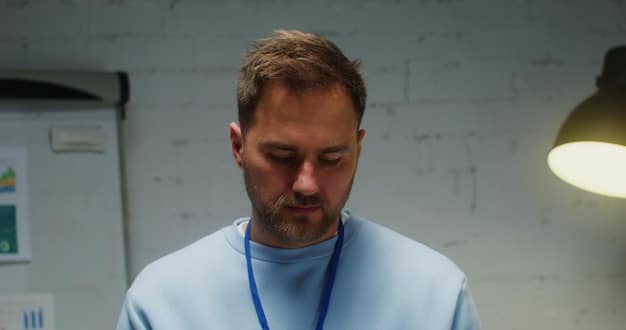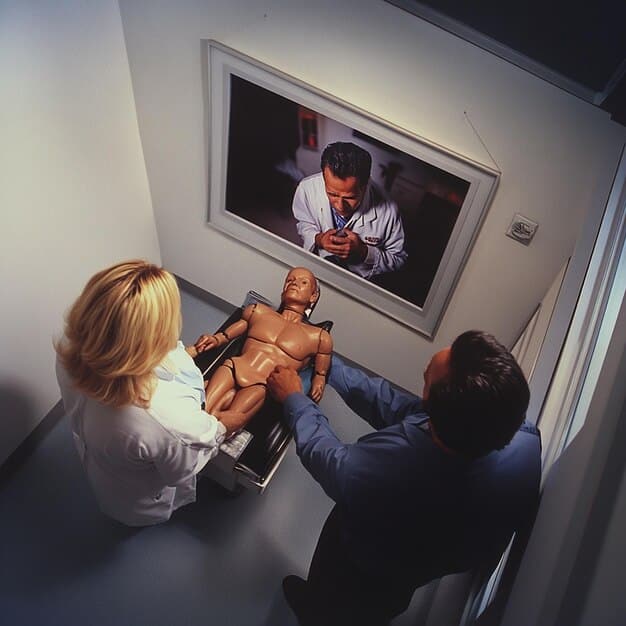Beyond the White Coat: Mental Health Challenges of TV Doctors

Beyond the White Coat: Exploring the Mental Health Challenges Faced by TV Doctors delves into the often-overlooked struggles of fictional medical professionals, shedding light on the unrealistic expectations and intense pressures they face.
The world of medical dramas often portrays doctors as heroes, seamlessly navigating life-or-death situations. But Beyond the White Coat: Exploring the Mental Health Challenges Faced by TV Doctors reveals a different story, one of intense pressure, unrealistic expectations, and the potential toll on their well-being.
The Glamorized Reality of TV Doctors
Medical dramas have captivated audiences for decades, offering a glimpse into the high-stakes world of hospitals and the lives of those who work within them. However, the portrayal of doctors on TV often presents a glamorized reality, masking the significant mental health challenges they may face.
From long hours to life-or-death decisions, the stress experienced by TV doctors can be immense. While dramatic storylines make for compelling television, they can also downplay the emotional toll on healthcare professionals.

Unrealistic Expectations and the Hero Complex
TV doctors are often portrayed as infallible heroes, capable of handling any medical crisis with unwavering confidence. This “hero complex” sets an unrealistic expectation, both for the characters themselves and for viewers.
The Impact of Constant High-Pressure Situations
Medical dramas thrive on dramatic tension, with doctors constantly facing high-pressure situations. This constant exposure to stress can have a detrimental impact on their mental well-being.
- The toll of making life-or-death decisions.
- The emotional impact of patient loss.
- The pressure to perform perfectly under immense stress.
The portrayal of doctors as superhuman figures can contribute to a lack of understanding and empathy for the real struggles faced by healthcare professionals. It’s crucial to recognize that even fictional doctors, like real-life medical personnel, are susceptible to mental health challenges.
Long Hours and Sleep Deprivation
One of the most common realities of being a doctor, both on TV and in real life, is the demanding schedule. Long hours and constant sleep deprivations are often romanticized but can have severe consequences on mental health.
Medical residents and doctors often work shifts that stretch for 24 hours or more, leading to exhaustion, burnout, and increased risk of medical errors. Medical dramas often depict these grueling hours, but the true impact on mental health is often glossed over.
The Correlation Between Sleep Deprivation and Mental Health
Studies have shown a strong correlation between sleep deprivation and mental health issues such as depression, anxiety, and decreased cognitive function. When doctors are consistently sleep-deprived, their ability to make sound judgments and provide effective care can be compromised.
Coping Mechanisms and Their Limitations
- Relying on caffeine or energy drinks to stay awake.
- Ignoring personal needs and relationships.
- Suppressing emotions and avoiding seeking help.
- These mechanisms may provide temporary relief but can ultimately exacerbate the underlying problem and lead to burnout.
It’s important for medical dramas to address the challenges faced by fictional doctors regarding long hours and sleep deprivation, acknowledging the need for sustainable solutions that prioritize mental health and patient safety.
Emotional Detachment vs. Compassion Fatigue
Doctors are taught to maintain a certain level of emotional detachment to effectively treat patients and make objective decisions. However, this detachment can sometimes lead to compassion fatigue and burnout.
Striking a balance between empathy and objectivity is vital for doctors to provide compassionate care without becoming overwhelmed by their patients’ suffering. Medical dramas often depict the struggle to achieve this balance, as fictional doctors grapple with the emotional demands of their profession.
The Double-Edged Sword of Emotional Detachment
Emotional detachment can be a valuable coping mechanism for doctors, allowing them to remain calm and rational in stressful situations. However, if taken to an extreme, it can lead to emotional numbness and a lack of empathy.
Compassion Fatigue: The Risk of Caring Too Much
- Feeling overwhelmed by patients’ suffering.
- Experiencing emotional exhaustion and cynicism.
- Withdrawing from colleagues and loved ones.
Emotional regulation is crucial for doctors, particularly those portrayed in medical dramas, to navigate the unique challenges of their profession without compromising their mental well-being. Exploring healthy coping mechanisms and support systems is essential to prevent burnout and ensure that doctors can continue providing compassionate care.
The Stigma Surrounding Mental Health in the Medical Field
Despite the growing awareness of mental health issues, stigma persists in the medical field. Doctors may fear seeking help due to concerns about professional repercussions or judgment from colleagues.
Medical dramas can play a vital role in normalizing conversations about mental health and encouraging doctors to prioritize their well-being. By portraying fictional doctors who seek help for their emotional struggles, these shows can challenge stigma and inspire real-life healthcare professionals to do the same.

The Fear of Professional Consequences
Doctors may hesitate to seek mental health treatment due to concerns about their careers. They may worry about being seen as weak or incompetent, fearing that their professional reputation could be jeopardized.
Breaking Down Barriers: Normalizing Mental Health Discussions
- Creating a culture of openness and support within the medical community.
- Providing access to confidential mental health services.
- Educating doctors about the importance of self-care.
By addressing the stigma surrounding mental health, medical dramas can contribute to a more supportive and accepting environment for healthcare professionals, both on and off screen.
Substance Abuse and Self-Medication
The high levels of stress and emotional demands experienced by doctors can sometimes lead to substance abuse and self-medication. Overworked and burdened physicians might turn to drugs or alcohol to relieve pressure or cope with challenging emotions.
Medical dramas often depict the dangers of substance abuse among doctors, highlighting the consequences of turning to drugs or alcohol as a means of coping with stress and emotional pain.
The Cycle of Stress, Substance Abuse, and Mental Health
Stress can trigger or exacerbate mental health issues, leading some doctors to turn to drugs or alcohol as a means of self-medication. However, this can create a vicious cycle, as substance abuse can further worsen mental health and impair cognitive function.
Promoting Healthy Coping Mechanisms and Support Systems
Medical dramas can showcase alternative coping mechanisms and support systems that promote mental health and well-being, providing viewers with valuable resources for managing stress and seeking help when needed.
- Seeking therapy or counseling to address underlying emotional issues.
- Practicing mindfulness and stress-reduction techniques
- Connecting with colleagues and loved ones for support.
By portraying the dangers of substance abuse and promoting healthy coping mechanisms, medical dramas can contribute to a more balanced outlook on healthcare professionals’ well-being.
The Impact on Personal Relationships
The demanding schedules and emotional toll of being a doctor can strain personal relationships. Spending too much time at the hospital and not enough time with loved ones can cause complications in familial and romantic partnerships.
Medical dramas often explore the impact of the medical profession on doctors’ personal lives, portraying the challenges of balancing work and family obligations. This theme provides a platform to address the importance of work-life balance and the need for healthcare professionals to prioritize their relationships.
Doctors who neglect their personal relationships may experience feelings of loneliness, isolation, and resentment, which can further exacerbate mental health issues.
- Scheduling dedicated time for loved ones to reconnect and strengthen bonds.
- Being present and engaged during quality time, setting aside work-related thoughts.
- Seeking counseling to address relationship issues and improve communication.
Medical dramas have the power to help real-life healthcare professionals navigate personal issues by reminding viewers that being a physician, whether real or on television, does not have to come at the expense of familial and romantic ties.
| Key Point | Brief Description |
|---|---|
| 🩺 Glamourized reality | TV shows often oversimplify doctors’ intense stress. |
| 😴 Sleep deprivation | Long shifts can lead to decreased cognitive function. |
| 💔 Emotional detachment | Balancing empathy with objectivity is vital. |
| 🚫 Mental health stigma | Many avoid treatment fearing career consequences. |
Frequently Asked Questions (FAQs)
▼
TV often condenses long shifts into short scenes, overlooking exhaustion. It rarely shows the administrative tasks and personal sacrifices real doctors make.
▼
In TV shows, there’s both lack of time and stigma around mental health, fearing it could hurt careers. This mirrors a real concern in the medical field.
▼
Continual sleep losses from demanding shifts can impair sharpness. This may lead to doctors taking longer to correctly diagnose the cause of medical issues.
▼
Hospitals have begun to offer counseling and limit shift durations. These actions provide more opportunities for doctors to seek work-life balance, or rest.
▼
They can develop problems with loneliness or anxiety if ignoring relationships. These feelings harm focus, attention, and ultimately, quality of attention at work.
Conclusion
Exploring the mental health challenges faced by TV doctors shines a light on the often-overlooked struggles of healthcare professionals, both fictional and real. By addressing issues such as unrealistic expectations, long hours, emotional detachment, stigma, substance abuse, and the impact on personal relationships, medical dramas can contribute to a more realistic and empathetic portrayal of the medical profession, promoting awareness and encouraging healthcare professionals to prioritize their well-being.





